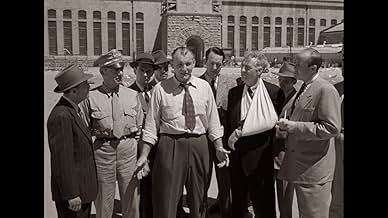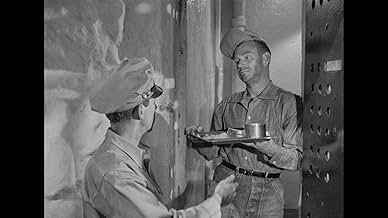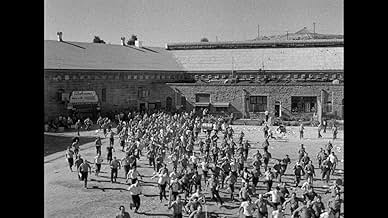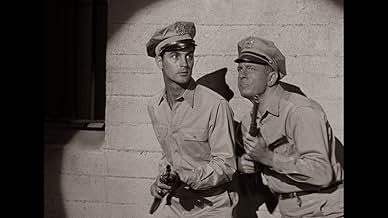Aggiungi una trama nella tua linguaFed up with the inhumane prison living conditions, a general prison riot breaks out, leading to hostage-taking, a stand-off with the guards and eventual negotiations with the prison administ... Leggi tuttoFed up with the inhumane prison living conditions, a general prison riot breaks out, leading to hostage-taking, a stand-off with the guards and eventual negotiations with the prison administration officials.Fed up with the inhumane prison living conditions, a general prison riot breaks out, leading to hostage-taking, a stand-off with the guards and eventual negotiations with the prison administration officials.
- Nominato ai 2 BAFTA Award
- 3 candidature totali
Recensioni in evidenza
When the film begins, there is a preachy prologue about prison riots and how they are the fault of the politicians and the people for allowing prisons to become that rotten. While to some extent this is true, the message come on about as subtly at a baseball bat against your skull. Then the film begins, a fictionalized account of prisoners rioting at a prison and the ineffectiveness and duplicitous nature of public officials in dealing with it. Again and again, the Warden advises for restraint and seems very much in agreement with most of the prisoners' demands...and time and again, the powers that be think the best way to handle the prisoners is to bluster and lie.
So if the film comes off as a bit preachy, why do I still give it a 7 (and I was tempted to give it an 8)? Well, the acting is really terrific. Neville Brand is great as the prisoner in charge of the rioters and the rest of the actors did a really nice job. Had the message been toned down a tad, the film might have earned a 9.
The resulting 1954 80 minute gritty drama, almost an unprecedented certificate 15, even now, was directed by Don Siegel. Following a popular format in those days, it starts off with a social documentary approach, complete with concerned voice-over - that this is a public announcement, part expose, part drama. It is not based on fact, at least not from one singular incident.
As you might expect, we follow prison guards (my title is the warning given to them, as they arm-up to thwart the riot), politicians and those who shape policy and of course, a handful of inmates. These provide everyday backbone; their tales are simple and uncomplicated and it's impossible to not side with them, or at least their plight. As ring- leaders take guards hostage, it becomes a nail-biting cat and mouse scenario, with Dunn (Neville Brand) producing ultimatums. Warden Emile Meyer wants negotiation, state officials want only swift force.
The film is well made and tautly directed, efficient but doesn't feel rushed. The version I saw on TCM (Turner Classic Movies) had a slight green cast but was generally good. I imagine that Riot In would have been compelling and possibly controversial viewing for cinema goers. It would have found favour especially amongst those who liked the hard crime film-noir type of dramas of the day, but without any of the glamour of femme fetales.
My guess is that whilst many prison dramas had been made at this point, they were character-lead and not out to socially comment. This would have been as hard-hitting as any TV '60 Minute' (etc) documentary and because it's still a good and credible film, it's still within the public domain, though is rarely shown and expensive to buy.
The prisoners make their demands known, and they want them printed in the papers for all the public to see. They want to be involved in a work program instead of sitting idle; they want the jail to be less crowded and better organized. If their needs are not met, guards will be killed, and the blame will be placed on the penal system authorities. The liberal warden of the prison actually wants to grant their demands, but his budget is constrained by politicians far removed from the system, and thus he is helpless as the clock ticks down.
The film is non-stop excitement and drama. I liked seeing the relationship between the prisoners, and their roles in the revolt. Neville Brand, with a gravelly voice and a build like a Sherman tank, is perfectly cast as the group leader and negotiator.
The movie is based on a story of an actual prison riot in the 1950s, and producer Walter Wanger's experiences as an inmate. Isn't it odd that celebrities get religion on the issue of prison reform AFTER they have been behind bars? Dan Rostenkowski comes to mind too.
The storyline starts quickly with a group of prisoners taking their warders hostage and barricading themselves in their cell block. Narrative then follows the proceedings to their conclusion, the action never straying from the prison itself.
Film succeeds mainly as a result of not having any forced characters - none of the prisoners are particularly likable and there are none of the usual dumb characterisations usually found in prison movies. The various authority figures deal with the situation they are presented with in a matter of fact way, and the films stark style remains through to the end.
As I was watching 'Riot in Cell Block 11' I was dreading some wise old sage prisoner coming out of the woodwork, due for parole the following week, who was somehow going to contrive to get himself shot just as the riot was coming to a close, to enjoy a lengthy death scene in someone's arms. Thank goodness nothing like this occurs.
Film made me think of 'Killer's Kiss', in that they are both 1950's low-budget movies with great potential, from a soon-to-be famous director. 'Riot in Cell Block 11' succeeds in all areas, and while its targets may be low it certainly deserves more recognition.
If I have a complaint about the movie, it would be that none of the characters are really examined deeply. I would have liked to have learned more about some of the ringleaders of the riot, as well as some of the guards. Though such deeper examinations might have made the movie much longer than the lean yet efficient eighty minute running time, and the movie might have dragged. But that's a minor problem; the movie as a whole works very well.
Lo sapevi?
- QuizLeo Gordon had served five years for armed robbery at San Quentin State Prison. For this reason, Heinze, the Folsom warden, originally objected to Gordon appearing in the film, but director Don Siegel was able to convince him that Gordon was no threat to the prison.
- BlooperWhen the state police force the convicts back into the prison by launching a barrage of tear gas at them, the police move forward, into the area being bombarded. The convicts are overcome by the gas, but the police aren't - even though they're not wearing gas masks and are enshrouded by the same gas the convicts are.
- Citazioni
Warden Reynolds: I promise you no harm will come to you during this conversation. Guard! These are my instructions. Dunn is to be allowed to come into this yard and return to 11 without interference.
- Curiosità sui creditiThe following acknowledgment appears after the opening credits: "We wish to thank Mr. Richard A. McGee and his staff of the California Department of Corrections, Warden Heinze, Associate Warden Ryan, Correctional officers and the inmates of Folsom Prison for their co-operation."
- ConnessioniEdited into I sanguinari (1955)
I più visti
- How long is Riot in Cell Block 11?Powered by Alexa
Dettagli
Botteghino
- Budget
- 298.780 USD (previsto)
- Tempo di esecuzione
- 1h 20min(80 min)
- Colore
- Proporzioni
- 1.37 : 1


































